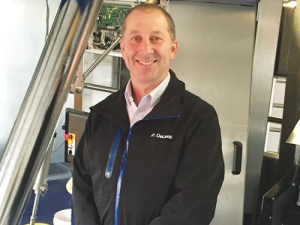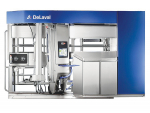DeLaval had appointed a new regional head.
Andrew Pooch, who took up his new role earlier this year, is keen on connecting DeLaval better with New Zealand farmers.
"My mission is to elevate DeLaval back to being world leader in New Zealand – a position we used to occupy," he told Dairy News.
To do that, it's crucial to understand what NZ farmers want, Pooch says.
He is keen to introduce equipment and technology which has already been proven in other countries which is quickly gaining relevance here. However, New Zealand will remain a major manufacturing base for DeLaval.
"We still manufacture a great deal of equipment in NZ to distribute to the rest of the world; it's certainly not our intention to make everything overseas and import as we see strength in our local manufacturing capability"
DeLaval's main businesses in NZ is supplying milking machines both conventional and robotic as well as providing after sales services to farmers.
Pooch notes there is strong competition in all sectors, leading to DeLaval losing some ground.
"If you look at conventional milking, rotaries and herringbone, we have very good local competitors in the area," he says.
In after-market service, farmers have a lot of choice; they can buy products directly from manufacturers or rural retailers. They also have a choice of buying from dealers who represent companies like DeLaval.
Pooch believes local dealers have to develop closer working relationships with farmers.
"With farmers, our dealers are delivering more than just products; they have to develop a relationship."
Robotics remains a major focus for Pooch; in New Zealand the uptake of robotic milking machinery is lower than in Australia, Europe and North America.
It's a clear technological leap and normally a small group of farmers are early adopters. Pooch believes DeLaval and other robotic milking suppliers must ensure these farmers succeed.
"We need to grab hold of early adoptor farmers and help them become very successful," he says. "When another group of farmers see their success and the benefits robots can offer, they will jump on board.
"It's a bit like any other technology -- like VCR or DVD players -- few people jump in early; when the rest see it as a good idea they all adopt it.
"I think the role of suppliers in robotics is to ensure farmers are well supported to deliver great results; we need to show how robots operate in NZ's grasslands environment and can do so successfully."
Pooch says farmers have expectations to see paybacks from robotics and rightly so. While robotics is in its infancy in NZ, about 50% of European farmers are using robots to milk cows, and more farmers in North America and Australia are embracing the technology.
Pooch is confident once NZ farmers see the benefits that come with robotics, NZ will see an increase of robots being installed nationally.
"We just have to work harder to get the early adopters into it and be very successful. We also have to do a better job in NZ of communicating the benefits; it's not about installing a robot and then going fishing."
Pooch believes robotics help attract younger workers to the sector and keep the farming business within the family.
He says the younger generation's fascination with technology means they are enticed towards a future in milking cows after seeing a robot operate and understanding the possibilities it brings.
Robots change the farm management; instead of having a worker milking cows they use their time more effectively in other areas, doing the chores a farmer usually has to pay someone else to do.
Pooch says it's important to make the case for robots.
"We have to start demonstrating some of the success stories; we can start showing farmers how milk production goes up and cow longevity increases; these are serious things including putting more money in the bank! "We need to show those things outweigh the capital cost of the robots."


















